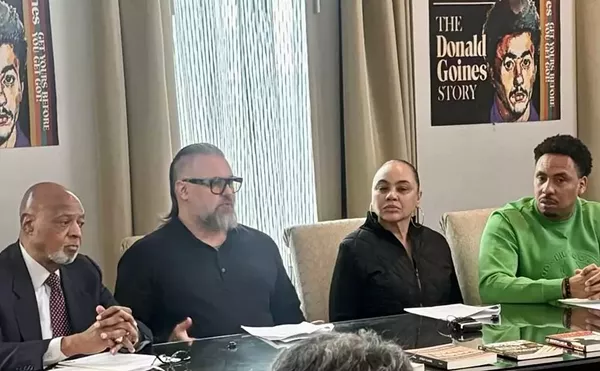Detroit has a history with sampling, from Carl Craig’s earliest works to Shake’s relentless workouts to the constantly reinvigorating reinventions of Kenny Dixon Jr. But few artists in recent years have pushed the boundaries and possibilities of sampling as much as London’s Matthew Herbert. From his own personal manifesto, Herbert refuses to sample other people’s music, instead choosing to take recordings of sounds from his personal life (and — on his latest album — from his own body) and turn them into the necessary ingredients for some of today’s most innovative and inspired music. This is more than turning Pringles being crunched into a snare, this is the concept of musique concrète made sensual.
Herbert’s sound has even found its way onto a Detroit record, Recloose’s “Can’t Take it (Dub)” on Planet E. Last year Herbert released the exciting mix CD, Let’s All Make Mistakes (Tresor), featuring Detroit artists Dan Bell, Theo Parrish and Richie Hawtin. This year his electro-acoustic jazz album, Bodily Functions (!K7/soundslike), has been a crossover success, bringing his sound to an ever larger audience and giving him the opportunity to tour the United States. On Thursday, Aug. 30 he’ll bring his special show with live sampling and interaction between Dani Siciliano (vocals) and Phil Parnell (piano) to Motor in Hamtramck. Later that night at detroit contemporary, Mooner of Zombie Nation will be doing his special brand of eight-bit video game New Wave and electro. Here are a few words from when I recently caught up with Herbert:
Metro Times: Are there particular artists with the sampler who inspired you?
Herbert: The sampler is the most important instrument ever made. It allows for anything which makes noise (i.e., anything) to be turned into music. So rather than other good music, my influences are therefore good things, like my environment, my friends, and truly evil shit like McDonald’s and Starbucks. I always find Britney Spears more of an influence since I am determined to do something better in the world than that.
Metro Times: Triple question: Was “So Now” your first cut with Dani Siciliano? How did you meet her and start working together? “So Now” has the feel of a Prince record — was he a major influence?
Herbert: “Going round” was actually our first record. Our working relationship grew out of our friendship. This started in San Francisco in ’95. The whole Prince thing is Dani’s influence, although he wasn’t really an influence for this song.
Metro Times: Obviously samplers play a major part in your studio. How important are the computers you use? Do you obsess over mic techniques?
Herbert: The joy of a sampler is the fact that it’s empty. It only puts out what you put in. Any information therefore, no matter how trivial, is recorded and becomes a diary of your life. Thus technique is less important.
Metro Times: Any specific examples of a mistake in the studio that has led to a favorite moment within one of your tracks?
Herbert: My whole catalog. Although, the fact that a mouse in the studio fell into a rubbish bin and scrabbled about allowing me to record it and incorporate it into the new record is in the top three.
Metro Times: Any artists today using samples that you find inspiring or innovative?
Herbert: Matmos and their use of plastic surgery.
Metro Times: Laptop shows: Are they equivalent to checking your e-mail on stage or a valid performance tool?
Herbert: It would be if a) the audience knows what you are doing or b) you weren't performing on stage in a rock set-up with lights, etc.
Metro Times: Has Detroit made a major impact on your sound? Any particularly favorite artists or records or DJs-performers?
Herbert: One obviously inherits a musical history and context for your own music, even if you weren’t directly influenced yourself. The obvious respect goes to Mike Banks and how he conducts himself in an industry rife with mediocrity. But the list of great labels and artists is a long one. Musically I think “Be Brave,” the Model 500 track, is my favorite Detroit record.
Metro Times: In your manifesto, point three states: “The sampling of other people’s music is strictly forbidden.” But what of shards of records processed into something new or using the turntable as an instrument?
Herbert: That’s other people’s pieces of plastic. Or do you mean DJ culture? The manifesto is a personal thing relating to my compositional process and doesn’t reflect how I feel about hip hop, for example.
Metro Times: Fantasy question: If you could work with anyone living or dead or fictional in your studio, who would it be?
Herbert: John Cage.
E-mail Pitch’d at [email protected]





